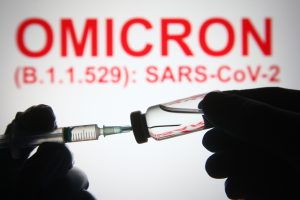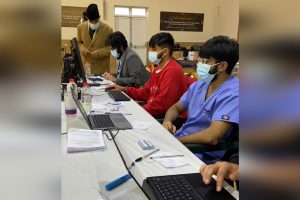
Dr Shahzaib Ahmad, UK
The UK is currently rapidly vaccinating its population against COVID-19. Vaccination is the backbone that can help the country and world return to a sense of normalcy. If the UK gets one thing right during this pandemic, it must be the rollout of its vaccination programme.
On the whole, there has been a high uptake of the COVID-19 vaccines, with more than 20 million people in the UK and 200 million people across the world to have received at least one dose. [1] However, there are also those who show apprehension. For example, an international poll commissioned by The World Economic Forum found that while 73% of people agreed to be vaccinated when it’s available for them, only 52% agreed to have a jab within the first three months of a vaccine being rolled out. [2,3] This survey and other research have shown that people who are hesitant to take a vaccine are concerned about side effects, sceptical about whether any vaccine could help to reduce transmission, and worried that vaccines have been approved too quickly. Even prior to COVID-19, vaccine hesitancy was recognized by the World Health Organization as one of the ten greatest public health threats. [4]
In particular, vaccine hesitancy is worryingly high among some communities and sub-populations. Evidence from the US and the UK show that people from Black, Asian or minority ethnic groups (BAME), the same demographic groups that are most severely affected by COVID-19, are more likely to show negative attitudes to vaccines. [5,6] It has been reported that even amongst frontline healthcare workers, BAME members have a substantial rate of vaccine decline. [7]

As a practising doctor working in intensive care, I too have also seen that among some people, negative attitudes driven by misinformation around COVID-19 vaccines is still present. Among some communities, in particular Black communities in the USA, mistrust around vaccines is partially due to historical experiences of discrimination faced through the health care system, and so overcoming those barriers requires substantial community engagement. [8] However, for many people who are sceptical or worried about COVID-19 vaccines, it is important to understand the evidence base and overcome misinformation. Below, I aim to address some of the most common myths and concerns.
Please note:
Readers should be aware that there are several vaccines approved across the world, each with their unique composition. In the UK, currently, the approved vaccines are made by Pfizer/BioNTech and Moderna vaccines (both mRNA based) and Oxford-AstraZeneca (viral vector-based). The myths and concerns I address relate specifically to these approved vaccines, while recognizing that in other countries, different vaccines may have been approved. Ultimately, you should speak to your own general practitioner or health care provider to get specific clinical advice about your individual circumstances and whether you should take a vaccine.
‘Do COVID-19 vaccines work, how can we be so sure?’
All approved vaccines (both mRNA and viral vector-based) in the UK, were first tested in laboratory studies, followed by rigorous safety studies (Phase I/II), and finally in large scale clinical trials (Phase III) over many months. [9] In these clinical trials, about half of the participants were randomly assigned to receive a placebo and the other half a vaccine. Over time, researchers monitored whether people in each group developed any adverse effects and how many people became seriously ill with COVID-19. In all three of the approved vaccines, an overwhelming majority of people who received the vaccines did not develop severe illness, while in the control group, they became ill with COVID-19 at the typical rate within the population. The vaccine efficacy, or the ability of the vaccines to prevent severe illness compared to a placebo, was shown to be between 67% and 94%. [10, 11, 12]
Importantly, these vaccines were tested in thousands of people across many countries. The Pfizer/BioNTech trial had 44,000 participants, the Oxford/AstraZeneca trial had 23,000 participants, and the Moderna trial had 30,000 participants. [10, 11, 12] This large sample size, helps to robustly assess the efficacy of the vaccines. Collectively, these vaccines were even tested in more people than some other vaccines used in routine immunization programs. [13] The high rate of efficacy shown in thousands of participants across the world, gave scientists and regulatory authorities strong evidence and confidence that these vaccines do help protect against the disease. Till today, as millions of people in several countries are being vaccinated, scientists are continuing to monitor their impact. For example, preliminary findings from Scotland, using ‘real-world evidence’ reaffirm that vaccines are helping to reduce hospitalizations and reducing the rate of severe illness. [14]
‘Are these vaccines safe, and what about their side effects?’
In the UK, the Medicines and Healthcare products Regulatory Agency (MHRA) independently reviews the scientific evidence related to the safety, quality, and efficacy of all medical products, before approving them for wider use. The agency also monitors the side effects of vaccines once they are rolled out. Prior to their approval, the vaccines were known to have some side effects in about 10% of people. [15] These included: pain at the injection site, fatigue, headache, myalgia (muscle pains), chills, arthralgia (joint pains), and fever. These reactions were usually mild or moderate in intensity and resolved within a few days. Moreover, side effects were reported less frequently in older adults (over 55 years) than in younger people. [10]
In MHRA’s more recent analysis of nearly 7 million people in the UK who received vaccines as part of the national roll-out, side effects were reported at a much lower rate, in 0.3% of people. [15] The most common side-effects were a sore arm and mild headaches, similar to the side effects of the flu vaccine. Generally, these occurred shortly after the vaccination and were not associated with more serious or lasting illness.
Those who have tried to spread misinformation about the safety of the vaccines have misconstrued the alert issued by MHRA that there is a risk of anaphylaxis or a severe allergic reaction. The MHRA has found that in a very small number of people, a rate of 1 to 2 cases per 100,000 doses, have experienced an allergic reaction. [15,16] Similar reporting was seen in the United States. However, anaphylaxis is a known side effect in many medications and the risk is not more than other vaccinations. [16] Hence, in people known to have severe allergic reactions, the MHRA recommends close monitoring for 15 minutes after receiving a dose. [16] Overall, the above data demonstrate that vaccines are safe for the vast majority of people.

‘Vaccines take years to develop, how was the COVID-19 developed so fast?’
It is true that vaccine development is a slow process, which on average takes around 10 years. However, there are very good reasons why the COVID-19 vaccines were developed within a year. There has never been an internationally co-ordinated effort and alignment of goals to develop a vaccine at scale like this previously. [9] As an intensive care doctor, I witnessed knowledge sharing amongst the international community like never before. Before the pandemic even hit the UK, there were webinars and lectures from leading scientists in China and Italy informing us in the NHS on the treatment options for patients with COVID-19. Unprecedented knowledge sharing between scientists and a high level of global investment in research contributed to the rapid development of the COVID-19 vaccines. [9,17]
Additionally, often with vaccines, bureaucratic processes can slow down development. Much of this ‘red-tape’ was reduced by governments and allowed COVID-19 vaccine to be put ahead of the regulatory queue. In practice, this meant that different stakeholders, from the laboratory scientists and clinicians to the regulatory bodies, all had a common goal and the whole process was streamlined. [9,17] Finally, COVID-19, unlike many other epidemics, was truly global in scale. Since it was so prevalent, it was easier for Phase III trials to recruit participants, and given the high rate of infection, trials could relatively quickly show whether a vaccine was working or not. [9] The research was conducted rather quickly but still held to the same rigorous and stringent criteria used for other medicines and vaccines.
‘Vaccines don’t work!’
There is no evidence to support such a view. A high level of vaccine efficacy has been shown in multiple trials quoted above and more recent evidence also suggests that the declining number of COVID-19 hospitalizations can be attributed to vaccine rollout. [14] From a broader perspective, it is important to understand that vaccines are not ‘treatments’. They are preventative measures, that prime the human body’s natural immune system to defend against an infection. Over the 19th and 20th century, vaccines have been shown to be some of the most effective and safest health interventions in the world. [18] They have helped save hundreds of millions of lives by preventing illnesses and deaths related to diseases like smallpox, polio, measles, mumps, and rubella. [18] It is a testament to the effectiveness of vaccines that in recent decades, most people have never even encountered these diseases.

‘We don’t know what is inside these vaccines!’
All the companies that have produced approved COVID-19 vaccines have published what the vaccines are made of. For example, the US Food and Drug Administration (FDA) has published the main ingredients list for the Pfizer vaccine. [19] It consists of mRNA, lipids, some salt compounds, and sugars. The vaccines do not contain alcohol, pork, or any gelatine. [20] Moreover, some people have concerns that, in the case of the Pfizer and Moderna vaccines, they contain mRNA, which is a first for approved vaccines. While this is novel for a vaccine used so widely, the overall concept behind gene-based vaccines, be they RNA or DNA, has been developing for several decades. [9,21] The genetic component in these vaccines is not able to interfere or interact with human DNA, and only codes for a specific protein, so that the body can generate an immune response. [22] Similar vaccines have also been used in recent epidemics of Zika and Ebola. [22] As of today, millions of people have receiving mRNA vaccines without any major side effects, which is itself a strong indication of their safety.
‘I have already had COVID-19, therefore I don’t need the vaccine!’
Currently, the evidence shows that even people who have previously had COVID-19, are likely to benefit from having a vaccine. [23,24] This is because antibodies that develop after COVID-19 have been demonstrated to disappear after a period of time. [23] By taking a vaccine it may provide another stimulus to produce longer-lasting antibodies. As such, it is likely that taking a vaccine may help reduce the chance of being re-infected in these people. [24]
Concluding Thoughts
The easing of lockdown restrictions is dependent on reducing transmission and illness. A successful COVID-19 vaccination programme with high uptake can help tackle these issues. No government is mandating vaccinations and ultimately each person has the right to make their own choice. However, as a frontline healthcare worker who is treating patients every day with COVID-19, getting the vaccination is one of the easiest decisions I have made. If you want to meet your loved ones, laugh with them, spend time with them, and help keep both yourself and them safe from this devastating infection, then I urge you to consider taking a vaccine.
About the Author: Dr Shahzaib Ahmad is a specialist registrar in Intensive Care Medicine working in London, UK.
ENDNOTES
[1] BBC News. Covid vaccine: How many people in the UK have been vaccinated so far? – BBC News. (2021). Available at: https://www.bbc.com/news/health-55274833. (Accessed: 5th March 2021)
[2] Salyer, K. Here’s how global COVID-19 vaccine confidence has changed | World Economic Forum. World Economic Forum (2020). Available at: https://www.weforum.org/agenda/2020/12/covid-19-vaccine-confidence-world-economic-forum-ipsos-survey/. (Accessed: 11th January 2021)
[3] Imperial College London – Institute of Global Health Innovation. Covid-19: Global attitudes towards a COVID-19 vaccine. (2020).
[4] WHO. Ten threats to global health in 2019. Available at: https://www.who.int/news-room/spotlight/ten-threats-to-global-health-in-2019. (Accessed: 5th March 2021)
[5] Royal College of General Practitioners. GPs call for high-profile campaign backed by faith leaders and prominent figures from BAME communities to increase COVID-19 vaccine uptake. (2021). Available at: https://www.rcgp.org.uk/about-us/news/2021/february/gps-call-for-high-profile-campaign-backed-by-faith-leaders.aspx. (Accessed: 5th March 2021)
[6] National Foundation for Infectious Diseases. National Survey: Black Adult Perspectives on COVID-19 and Flu Vaccines. (2021). Available at: https://www.nfid.org/national-survey-black-adult-perspectives-on-covid-19-and-flu-vaccines/. (Accessed: 5th March 2021)
[7] BBC News. Covid: Lower jab take-up by BAME NHS staff ‘a concern’ – BBC News. (2021). Available at: https://www.bbc.com/news/uk-england-leicestershire-56069325. (Accessed: 5th March 2021)
[8] Huang, P. To Overcome Vaccine Hesitancy Among Black Americans, Doctors Inform And Empower : Shots – Health News : NPR. (2021). Available at: https://www.npr.org/sections/health-shots/2021/01/19/956015308/you-cant-treat-if-you-cant-empathize-black-doctors-tackle-vaccine-hesitancy. (Accessed: 5th March 2021)
[9] Ball, P. The lightning-fast quest for COVID vaccines – and what it means for other diseases. Nature 589, 16–18 (2021).
[10] Polack, F. P. et al. Safety and Efficacy of the BNT162b2 mRNA Covid-19 Vaccine. N. Engl. J. Med. 2603–2615 (2020). doi:10.1056/NEJMoa2034577
[11] Baden, L. R. et al. Efficacy and Safety of the mRNA-1273 SARS-CoV-2 Vaccine. N. Engl. J. Med. 384, 403–416 (2021).
[12] Voysey, M. et al. Safety and efficacy of the ChAdOx1 nCoV-19 vaccine (AZD1222) against SARS-CoV-2: an interim analysis of four randomised controlled trials in Brazil, South Africa, and the UK. Lancet 397, 99–111 (2021).
[13] Schiller, J. T., Castellsagué, X. & Garland, S. M. A review of clinical trials of human papillomavirus prophylactic vaccines. Vaccine 30, F123 (2012).
[14] Vasileiou, E. et al. Effectiveness of First Dose of COVID-19 Vaccines Against Hospital Admissions in Scotland: National Prospective Cohort Study of 5.4 Million People. SSRN Electron. J. (2021). doi:10.2139/ssrn.3789264
[15] Torjesen, I. Covid-19: First UK vaccine safety data are ‘reassuring,’ says regulator. BMJ 372, n363 (2021).
[16] MHRA. Coronavirus vaccine – weekly summary of Yellow Card reporting. (2021). Available at: https://www.gov.uk/government/publications/coronavirus-covid-19-vaccine-adverse-reactions/coronavirus-vaccine-summary-of-yellow-card-reporting. (Accessed: 5th March 2021)
[17] Wellcome. How have Covid-19 vaccines been made quickly and safely? | News | Wellcome. (2021). Available at: https://wellcome.org/news/quick-safe-covid-vaccine-development. (Accessed: 5th March 2021)
[18] Samantha Vanderslott, Bernadeta Dadonaite & Max Roser. Vaccination. Our World in Data (2019). Available at: https://ourworldindata.org/vaccination#vaccines-save-lives. (Accessed: 5th March 2021)
[19] FDA. Fact Sheet for Recipients and Caregivers. Available at: https://www.fda.gov/media/144414/download. (Accessed: 5th March 2021)
[20] There isn’t pork in Covid-19 vaccines. Full Fact Available at: https://fullfact.org/health/there-isnt-pork-in-covid-19-vaccines/. (Accessed: 5th March 2021)
[21] Ryan Cross. Will the coronavirus help mRNA and DNA vaccines prove their worth? (2020). Available at: https://cen.acs.org/pharmaceuticals/vaccines/coronavirus-help-mRNA-DNA-vaccines/98/i14. (Accessed: 5th March 2021)
[22] CDC. Understanding mRNA COVID-19 Vaccines. (2021). Available at: https://www.cdc.gov/coronavirus/2019-ncov/vaccines/different-vaccines/mrna.html. (Accessed: 5th March 2021)
[23] Zhao, J. et al. Antibody Responses to SARS-CoV-2 in Patients with Novel Coronavirus Disease 2019. Clin. Infect. Dis. 71, 2027–2034 (2020).
[24] If you’ve had Covid-19, do you still need a vaccine? Here’s what the experts say. Advisory Board (2021). Available at: https://www.advisory.com/daily-briefing/2021/01/06/vaccine. (Accessed: 5th March 2021)




Add Comment